- Home
- Giles Foden
Zanzibar Page 33
Zanzibar Read online
Page 33
About him, the other worshippers were following the proper devotions, according to the Koran. He tried to gather himself. Calling on Allah and hoping on Allah, he prayed that being condemned to sin might, in fact, have been a way of arriving at Him. Yet he knew, that no more than the sun could rise in the west, he had no warrant to make this claim on the Lord.
Read out! In the Name of thy Lord who creates, who creates man from a blood-clot.
Read out! For thy Lord is the Most Munificent who teaches by the pen, teaches man that which he knew not.
The mullah was expressing the uncreated, self-sufficient power of the Koran. The essence of the Book was Allah’s name – written alif, lam, lam, ha. Yet it surpassed the words by which man calls on Him, being a door to the essence of He who created the heavens and the earth with the truth, who splits the grain and date-stone, and holds the keys of the Unseen.
The times and speakings of the devotions jumbled in Khaled’s head. He felt afraid. There is no terror like that of God, who brooks no presumption, no division, is all and everything, ever has been and will be, absolute entire.
We have distinguished the signs for a people who know …
We have distinguished the signs for a people who understand.
Khaled felt a wave of resignation wash over him. One day, he knew, He that looses the winds and stirs up cloud, raising even the bones and broken bits of the dead to live again, would in his mercy reveal the explanation for all that had happened. Like – yet not like, exceeding similitude and the idea of similitude – a man of light coming into a dark room, He would show He contained the darkness of the room before He entered, comprehending all things.
Khaled heard the mullah’s voice from the steps of the minbar, echoing through the building, bouncing off the walls and smooth, pink-marble pillars.
The time would come, he knew: that dreadful hour when the earth was rolled like a scroll and the sun and moon brought together. The mountains would be plucked as wool-tufts and the limbs of the dead testify as to their deeds, good or evil.
Those who had turned away would be snatched by the scalp into the furnace, while those who were on the right hand, who were not in illusion or slumber, who performed their witnessings and preserved their trusts – they would enter the gardens, high honoured, one nation, indivisible, returned to God together.
And He would tell them, then, all the People of the Book – Muslim and Christian and Jew – of that whereon they were at variance. And so all would drink from that lake at the entrance to Paradise, the Single, the One, which is another name of God.
With prayers over, the crowd funnelled Khaled to the door, slowly at first then surging once people gained the main street, dispersing their individual ways. He blinked in the light. Fields of cocoa and nutmeg, limes and ginger, lay before him in the shimmering haze. Above the fields, carpets of jungle-bush covered rounded mountains.
He walked through the centre of Jambangona – past stone houses, mud huts, a small coconut-oil factory. Across the square, he could see his parents’ house, but he didn’t go to it. He could not face meeting their ghosts just yet. He saw, moreover, that there was an old man sitting outside. He recognised him as a local – a half-witted vagrant who lived by mending other people’s nets; he must have taken up residence there.
Unsure what he was going to do, Khaled made his way across a field to the river, which was shaded by mangroves entwined with creepers, and overhung by bundles of knotted liana. The holes of coconut crabs dotted the banks. The water was stagnant, the green of unripe bananas.
There were flowers everywhere, of every colour. He could smell their sweetness; bound up with it was a ghastly scent of putrefaction, where the roots of the mangroves rotted down into the wet, black soil.
It was, he remembered from childhood, a place where snakes were found. Once, he and his friend Ali had thrown rocks at a mamba till, pinned down, it was eaten by the coconut crabs emerging at dusk from their holes.
He looked into the water; its green surface was perfectly still. Suddenly overcome with panic, he fell to his knees and began to weep uncontrollably. He began touching the palms of his hands on the damp earth and passing them manically over his face and arms. He was hearing the voice at this time: go into the water, go into the water …
He tried to hang onto himself, to calm down and not catch the earth on his palms, not let his distress turn a ritual of purification into a deliberate soiling. He’d wanted to cleanse himself before returning to his parents’ house, to make his peace with their ghosts and deal with the vagrant. He wanted to find Ali, too.
The rite was the tayammum, purification by sand or stone – or, failing those, earth – when water was not available or unhealthy. In his distress, he was doing it wrongly, mixing earth with tears and sweat. The point was just to touch, not rub with earth. He should, in any case, have performed the ablution before prayer and not afterwards. It was, he reflected miserably, yet another sign of his sinful condition.
30
Zayn Mujuj manoeuvred the cabin cruiser past a rock in a creek, on the eastern side of Pemba. A cigarette hung between his lips. Sweat ran down his shaven head. Unfamiliar birds and animals were calling out to him. Yet he remembered this journey. He had been here before. He remembered how there were too many birds and animals and plants in this place. It was deep green, and he didn’t like it. He was more comfortable in treeless acres of barren ground. Palestine, Sudan, Afghanistan. Places of ochre. Places of rock. Places of the skull.
He was looking for Khaled. Once the bombs went off, the two of them were supposed to take the cabin cruiser from the quiet cove near Dar where it had been moored during the operation to rendezvous with a cargo ship in the ocean in the afternoon. This would take them to Muscat in Oman. Then Dubai again, Karachi, overland to Peshawar and across the border into Afghanistan, back to the Eagle’s Nest.
But it didn’t happen that way. The cargo ship hadn’t shown. They waited till dusk, then motored to Pemba, it being the nearest land to the rendezvous point. They would stay there for a week. Another deserted cove. Each night, Zayn called the Sheikh on the satphone. Where is the ship? It is coming. Where is the ship? There is a delay. Zayn was surprised at his own anxiety. In the mornings, he would send Khaled to buy fish from a village. They ate. They waited.
One bright day, everything changed. Zayn woke up in the cruiser, in the quiet cove. He could hear the sea’s quiet conversation, see the splashing, sparkling water, but it had little effect on him. Nor did the brilliant red-and-yellow woodpeckers in the palm trees, or the pelicans that swooped down over the sand. It was not in his nature to find such experiences pleasant. He resisted ascribing symbolic value to them, and was a wonderful killer exactly because of this, because he took the same approach with human beings. Yet sometimes, sometimes beauty played on him, disarming him momentarily, like bare-legged Sheba. Afterwards he hated again: all the more fiercely, for having chanced the loss of hate. He would die if love assailed him, if – like someone slipping into a tempting lake on a hot day – he allowed himself to forget what had happened to his family in Beirut.
One drop had poisoned him, turning everything to pain and woe. The slaughter had been carried out by the Israeli air force and the Christian Phalange, but the deeper blame lay with the United States, which had supplied much of the Israeli armoury and consistently maintained the line that the Israelis were ‘partners for peace’.
Zayn spat through the window into the water, remembering his brother’s body, beaten with iron bars by the Phalange till it was an unrecognisable mess of blood, remembering his holy dread of the Israeli jets tearing over the rooftops. The bombs they dropped on Abu Chaker street felled one apartment block after another, till they came to his home, burying his father, mother and baby sister under tons of concrete.
It was for this he hated the US and its mart of destruction, it was for this, for the better cause, that he had murdered Khaled’s parents, punishing the father for embezzling al-Qaida money
. Seeing a potential recruit, he’d then ensnared the young Zanzibari. He wasted no time feeling guilty about it: like shame and regret and hesitation, guilt was for fools.
He turned over and looked at the other bunk. The boy was not there. He must have gone early to buy fish. Zayn stood up, buttoned his jeans, and went up on deck. He looked sullenly across the waves at palm trees dappled by sun, rustled by wind. A dark switch chastised his conscience: these seaside sights and sounds were unreal. Only the task existed, which was in Allah.
He waited two hours. Then he knew Khaled had fled. That was a risk. He took out the briefcase to dial bin Laden on the satphone again.
Macerations of silk, the tone interrupting the thin hiss of the static; and then his master’s voice, no less soft, like the brush of a raven’s feather. Who? To other ears a blast of evil, to Zayn it was honeydew.
He told him that Khaled had become a security threat, had disappeared. He said he did not know why, but always thought the boy was weak.
They spoke in a crude, thinly veiled code. Osama was ‘the manager’. He was ‘comfortable’. He was ‘at his ease’. Yes, the Talibs, ‘the owners of the company’, were still happy with him. Khaled was ‘the timid finch’.
The manager said the timid finch must be killed if he will not return to Afghanistan with Zayn. He knows too much. And the ship? It will not come now. Why? There are delays. There are some problems in the organisation. A man has let us down. Zayn paused. Shush shush, went the satellite. Come soon, he heard the voice say. I have work for you here.
Suspecting Khaled had returned to his family’s place, a village – almost a town – up the creek, Zayn set off there in the boat. He took the cruiser up this narrow inlet choked with reeds and mangroves. Wild pigeons were calling at him from the banks, but he ignored them. Tree-coneys and monkeys were jumping about in the green tresses hanging over the water, a pygmy antelope came down to drink – but all these, too, he ignored.
Reaching Jambangona, he moored at a dilapidated quay, then began to search the market. Here were sesame seeds, tomatoes, cashew nuts, here were guavas, durians, yams, here were oranges, pulses, pods of kapok and vanilla, here were limes, cassava root, grapefruit all piled high in profusion. But he disregarded them. He ignored the donkeys also, wandering between the stalls, and the women with copper pots on their heads. This was why the Sheikh, the Director, Mr Sam prized him. Because he was implacable. Because he saw only the task at hand, which was Allah’s hand.
* * *
Jack Queller had arrived on Zanzibar the previous night. He joined Nick and Miranda for breakfast at the Macpherson. Da Souza began serving them coffee, sliced pawpaw, toast. Do they want eggs? The atmosphere was a little tense. Queller was having difficulty spreading butter on his toast. Nick was grilling him.
‘Couldn’t you have done something sooner? If you knew the dangers?’
‘Well I –’
Queller’s mobile rang, saving him. It was Altenburg, brusque. He had news from the listening posts at Langley.
‘SIGINT has picked up a series of calls off the island of Pemba. To bin Laden we think. You are the nearest agent. Can you check it out?’
‘Do you have a grid?’
Altenburg gave him the map reference.
‘We are sending a helicopter. Some men. But you might get there quicker.’
Why is he doing this? Queller wondered. What is he up to? If there is a prize to be found on Pemba, why doesn’t he just take the credit himself? Queller had lived among secrets so long he could see only what was clandestine, hush-hush: hidden plans, ulterior motives, strategies that sucked righteousness to themselves like a sponge sucked water. He could not see, for instance, that Altenburg might not be a ruthless empire builder. That he might be just an ordinary man doing his job.
‘How can we get to Pemba?’ he asked his breakfast companions.
Da Souza brought the egg, a pitiful thing, the white unravelling from the yolk. Queller felt a strange sympathy with it. Now Miranda was quizzing him about the call.
‘There’s a lead there,’ he said. ‘Calls have been traced. We need to go right away. We need a fast boat.’
* * *
Zayn moved round the ancient masonry, his shaven head ducking under lintels, fringes of straw. He was searching the stone houses, huts, the mosque at Jambangona. Curious faces watched him from windows. At a small coconut-oil factory the dust from milled husk made him sneeze and sneeze. A killer in blue jeans sneezing, an adept of the difficult trade of death sneezing: it was like the laugh of a demon. He had a knife in his tall boot, rage – bright as the white phosphorus of Israeli shells – burning in his brain. He made his way down to the river.
* * *
It took a little time. Nick borrowed his Belgian friend’s big motor boat, the Cythère. They travelled to Pemba. It was a very different island to Zanzibar, much hillier and heavily wooded in some parts.
Nick was at the wheel, Miranda was beside him. Queller sat a little way back, looking out to sea. The prow of the boat slapped down on each wave as it came. The green mass of the island loomed. From the midst of it, perched on the edge of hills, smoke rose from beehive-like stone buildings.
‘Copra kilns,’ Nick explained. ‘A friend of mine,’ he shouted back to Queller, ‘said the English pirate Captain Kidd hid his treasure here in the seventeenth century.’
‘Which friend?’ asked Miranda.
‘Leggatt,’ said Nick, from the side of his mouth.
They fell silent, remembering the dead Englishman.
* * *
There was no one at the river. Zayn returned to the house of Khaled’s parents. He’d pulled his knife out of his boot here, once before, slashing two throats in the darkness with savage efficiency. But this time there was no one there except an imbecilic old man mending a net. Zayn picked him up and shook him – but it soon became clear that the man, who nearly passed out with fright, knew nothing of Khaled’s whereabouts. That family died! That family were murdered! This was not the information that Zayn required. The old man was dropped and left trembling on the floor. Zayn took the boat up another shallow-water creek, further inland – past fishing villages, past ruined palaces hung with vegetation. The creek widened to a river, the river to an estuary, the estuary to a bay.
He was by the sea again, a town called Chake Chake. It was a port, there were fishermen, cranes, warehousing; it was also a holiday resort, there were tourists, knick-knacks, antiquities. He could see white faces among the black. Women in bikinis lying on the beach. Men in Bermuda shorts, haggling with boys selling pineapple chunks. They wore trays with straps made of plant fibre, had long wooden skewers loaded with pineapple. There were kayaks for hire. It all infuriated the Arab beyond measure. Sweat was pouring down his shaven head again. The sun was up. There were two cannons. There were decorated pillars. He was sweating for the Director. He was sweating for jihad.
He left the boat in the harbour, not deigning to check in at the port office. His eye fell on a beggar here, on a boy there. He pushed his way up the busy main street, Zayn Mujuj, killer in blue jeans. A briefcase in one hand. A knife in his boot. There was a sign, Main Street. Carved items were arranged on the pavements for sale. There were stalls with fabrics, shells, bangles. Zayn didn’t stop to look or buy. But he remained watchful, ever vigilant, scanning the streets for Khaled. If necessary, he would wait. He would complete the task.
He searched for another hour, then booked himself into the Hoteli ya Chake. After saying his prayers, kneeling on the floor of the room, he took a shower. Then he came downstairs and ordered grilled octopus. He wondered, looking out of the window, why such a crowd had gathered in the square.
* * *
There was nothing at the map reference. Just a deserted cove. A fishing village where they were directed further inland. Another small town. Yes, a stranger has been here. He injured an old man. He went up the Chake River. He went to Chake Chake. Queller shook his head and followed Nick and Miranda back to th
e boat.
They took to the water again. The green river debouched, into a blue bay. There was a town over there, some kind of port, some kind of resort – a lazy, tropical, sprawling place, with houses made from shattered coral, thatched with papyrus.
The empty sleeve of Queller’s missing arm flapped in the wind, pulling at his light cotton jacket where it was attached with a large safety pin. On the same side – though hidden under the jacket – an automatic pistol sat snugly in a brown leather shoulder-holster. He joined the other two by the wheel. The sun was up.
‘This,’ he said, as they crossed the dazzling bay, ‘is a beautiful spot. It’s not the kind of place in which you’d expect to be hunting terrorists.’
A pair of tourists whizzed across the bay on jet skis. Not long afterwards Nick drew in the throttle, and they chugged towards the entrance of Chake harbour. There were many dug-out canoes with outriggers, four or five big wooden dhows and a few modern boats with motors and fibreglass hulls. There was also, at a separate wharf, a steel ship of larger tonnage, berthed under a crane that was lifting crates of cloves off pallets lined up on a cement platform, outside a commodious warehouse.
Standing on white stone plinths raised above the quays, a pair of ancient Portuguese cannon guarded the entrance to the harbour. On both sides fishermen were releasing their catch – tuna, kingfish, mullet, shrimp and lobster, all glistening in the bright sunlight as they slithered from the nets into low wooden pens set out on the flagstones.
‘Would you look at that?’ murmured Queller.
Elsewhere in the bay there was a beach, upon which some jet skis and a few kayaks were pulled up. Nearby, stuck on iron poles in the sand, a sign, misspelt and faded, declared Kizunguzungu Motor Sports, Pleasure Croft for Hire.

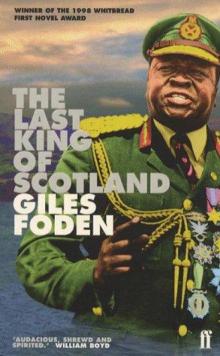 The Last King of Scotland (1998)
The Last King of Scotland (1998)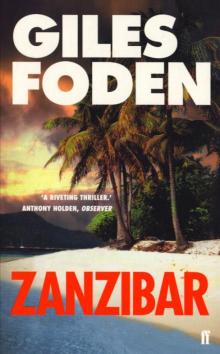 Zanzibar
Zanzibar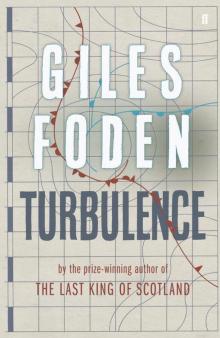 Turbulence
Turbulence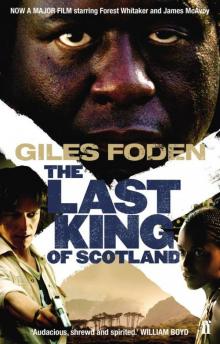 The Last King of Scotland
The Last King of Scotland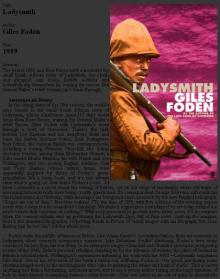 1999 - Ladysmith
1999 - Ladysmith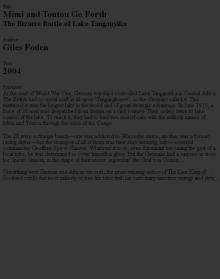 2004 - Mimi and Toutou Go Forth
2004 - Mimi and Toutou Go Forth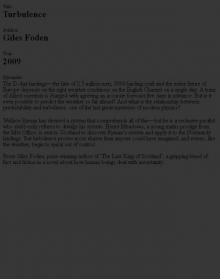 2009 - Turbulence
2009 - Turbulence